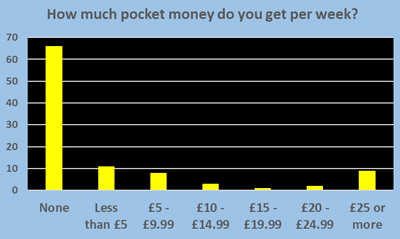How Much Pocket Money Do Children Get?
How Much Do We Give Our Children?

Pocket money is the only money children have access to and their first venture into the world of spending and saving. Traditionally it is a small amount used to buy little things like sweets or inexpensive toys. Or, in strong-willed children, it’s saved up to buy more expensive items that simply HAVE to be bought.
The amount of money given depends of course on the parent. When I was a lad, way, way back in the 1980s, I was given the grand sum of £1.25 every Saturday. In today’s money that is the equivalent of £3.08 – hardly a vast sum. But how much pocket money are children given nowadays?
Managing children's money is so important that whole websites are devoted to it. One site that we particularly like is Kids Money.
For this week’s survey we decided to find out. So, we asked 1,431 schoolchildren to tell us the amount they received. The results are very revealing.
Two-thirds of Children Get No Pocket Money
The main finding of our survey may surprise you. A whopping 66% of our respondents receive no pocket money at all. This may sound harsh to you. After all, how can children ever treat themselves if they have no money to do it with?
I cannot say for sure but I suspect that, rather than give their children money to spend, these parents treat their children themselves. I know this is the method I use. If my daughter wants something then I will consider buying it for her. This might actually be the equivalent of giving more pocket money than most receive so the statistics are not so bad as they sound.
Most Common Amount of Pocket Money is Less Than £5 Per Week
The second most popular answer, on a lowly 11%, was “less than £5 per week”. That seems fair to me. Allowing for inflation that’s what I had as a child, and a similar amount to what my friends got. It seems that times have not changed so much after all.
Slightly fewer children – 8% in our survey – receive between £5-£9.99 per week. Slightly more than I did but not by a huge amount. Higher sums are rarer: 3% of children receive £10-£14.99 per week, 1% £15-£19.99, and 2% get £20-£24.99 per week. Small numbers for larger amounts, as you would expect… or would you?
Large Portion of Children Get More Than £25 Pocket Money Per Week
Looking at the figures above, you can see that fewer children receive higher amounts. But this trend comes to an abrupt halt when we reach £25 or more. In my opinion, a larger than expected number of children (9%) receive that much money every week.
That amount of money for a child may seem excessive to some. After all, some families have less disposable income than that to last a whole week. But it is the way our society is arranged. Some have more, most have less. And the amount of pocket money children receive is no exception it seems.
How Much Pocket Money Should I Give?
As you can see from our survey, the amount of money parents choose to give their children varies drastically. The amount YOU choose to give is a choice only you can make. The most important thing to remember is to give only what you can afford.
There is a danger that, having seen that a large portion of children receive over £25 over week you will want to do likewise. My advice is not to do this. Giving more than you can afford sets a terrible example to children, and defeats the whole purpose of pocket money – to teach children how to handle money sensibly.
When Should I Start Giving Pocket Money?
At what age (if at all) you should begin to give money to your children is of course up to you. Most parents start when their child is starting school. That seems like a good time to begin familiarising children with money.
In KS1 children will start to be taught about money, its value and what it can be used for. They need to know that money is necessary to make purchases, that saving money allows for larger purchases, and that wasting money means having to wait longer to buy things. Having some money of their own to spend will help them to come to terms with these concepts.
Should Children Work for Their Pocket Money?
Whether or not children should do something in return for their money is another choice that only parents can make. Some families link pocket money to chores which can help children to get to grips with the idea that money has to be earned.
An alternative approach is to pay pocket money as the norm but to withhold it as a punishment for bad behaviour. This also teaches children a lesson – that their actions have consequences. However, this does not specifically link to the role of money in the real world. As with all parenting matters, at the end of the day, the choice is up to you.
Full Results of our "How Much Pocket Money Do Children Get?” Survey
Here are the results from the 1,431 children who answered our question "How much pocket money do you get per week?". The survey was conducted in the week ending 21st March 2021.
| How Much Pocket Money Do You Get Per Week? | Percentage of Respondents |
|---|---|
| None | 66% |
| Less than £5 | 11% |
| £5-£9.99 | 8% |
| £10 - £14.99 | 3% |
| £15 - £19.99 | 1% |
| £20 - £24.99 | 2% |
| £25 or more | 9% |



